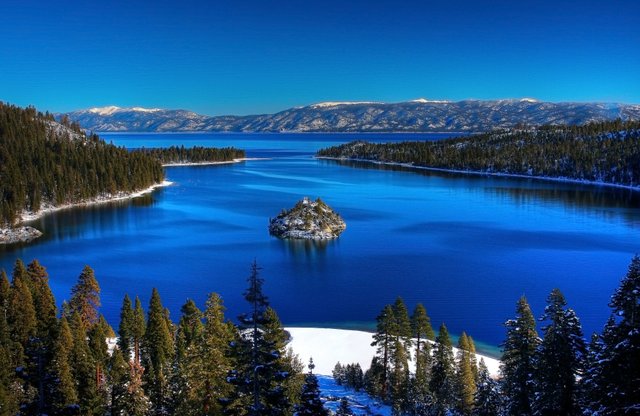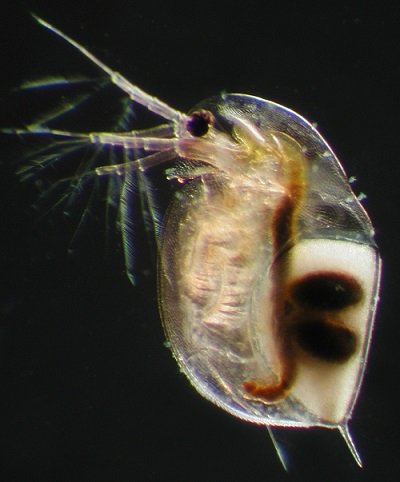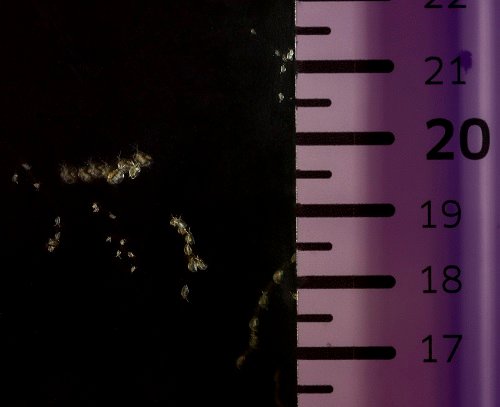New research suggests that freshwater sources is affected by the rising atmospheric CO2 levels, not just seawater
The fact that the ocean is affected by the rising CO2 levels in the atmosphere has been known for a while now, and I’m sure most people are aware of this issue by now. What happens is that increased carbon dioxide in the atmosphere will lead to more of it being absorbed into the seawater. This will in turn make the seawater more acidic, which has already shown to be a big problem for many marine ecosystems, especially for organisms that needs a calcium exoskeleton to live. I could probably write a few posts about how the acidification of oceans ruins different ecosystems, but in this post we will rather take a look at how the increased CO2 concentration in the atmosphere will affect freshwater sources such as lakes, streams, rivers and ponds!

Lake Tahoe in the US, an inland water body with freshwater. Image by Michael, posted with the Creative Commons Attribution 2.0 Generic license.
Up until very recently, no one had really done a comprehensive study on how the increased pCO2 (the partial pressure of CO2) affected inland bodies of freshwater, but a team from Ruhr-University Bochum in Germany decided to analyze water samples that went back 35 years. They already had yearly samples going back as far as 1981, and the results showed a trend where the CO2 levels of the lake increased along with the atmospheric CO2 partial pressure (not a big surprise). Along with this the pH decreased, meaning the lake got more acidic. However, they also found some evidence that this could negatively affect the Daphnia in the lake.
Wait, what exactly is a daphnia?
Daphnia is a genus of very small crustaceans that live in most in most bodies of water, and they are considered to be a keystone species in some ecosystems. These tiny crustaceans most often eat plankton, and optimal conditions for plankton will mean optimal conditions for these plankton-eaters. But why are these crustaceans even important in the ecosystem? Because they are the link between small fish and algae, and these grazers are very important on their trophic level.

A daphnia longispina, a very common species of daphnia found in most lakes. Note that this is not the same species that was used for the research we will learn about. Image by Dieter Ebert, posted with the Creative Commons Attribution-Share Alike 4.0 International license.
If the body of water don’t get enough sunlight we won’t get much plankton, which means less daphnia. This will reduce the food source for the small fish, and have huge effects on the ecosystem. If the daphnia are limited by other factors, it could also be devastating for the fish who rely on this food source, so they play a very important role in most food webs in freshwater lakes.
What is really cool about these creatures is that some of the species will grow helmets and spikes when sharing a lake with predators. If they however live peacefully in a small pond without any fish to eat them, the same species of daphnia will opt to not waste energy on producing these, but will instead spend this energy on growth and reproduction. This is a good examples of a trade-off where they can opt to have better defense, but this will also reduce their reproductive output, which is an important ecological concept.
Anyway, let’s turn our attention back to the research that was recently published about the rising pCO2 levels and how it affected the daphnia.

How daphnia looks like if we don’t use a microscope. Most species are even smaller and cannot be seen by the naked eye. Image by Lennart Lennuk, posted with the Creative Commons Attribution-Share Alike 4.0 International license.
How the Daphnia reacted to increased atmospheric pCO2
When looking at the 35 years worth of samples, the research team noticed that the daphnia were not able to produce neither helmets nor spikes on their head when the water source had increased pCO2 levels in the atmosphere. They believe the reason is that the daphnia are not able to do this is because this increased level interrupts their ability to sense predators (which they do with chemoreceptors on their antennae that presumably percepts chemicals released by the predators during molting; this is a bit complicated, but you can read about it in the paper).
What is interesting is that the research team believes that this interruption is only made with increased pCO2 levels, not by acidification itself, so this is why we have not seen the same thing happen with acid rain that has acidified so many bodies of water all over the world. This figured this out by doing experiments where they lowered the pH by using hydrochloric acid instead of carbon dioxide, and here the sensory interruption was unaffected.
But acid rain got a lot of very bad consequences by itself. Image is Public Domain.
There is still some unanswered questions from this research, and the big one is if this happens all over the world, or if the data sample had a confounding factor that affected the results. Sadly it’s very rare to have water samples running back such a long time, so it's unlikely that we will know this in the first few years, but hopefully a new experiment can test this hypothesis again with another lake at one point. We also don’t know exactly how this will affect the ecosystem, so this will be really interesting to read about once it’s been studied! I would assume that we could see some huge consequences from the daphnia being much easier to eat for the fish, but this may even affect the ecosystem in different ways than we anticipate.
Thanks for reading
Thanks for reading my post, and as always, leave a comment below if you got anything on your mind!
It’s of course very unfortunate that the increased pCO2 levels in the atmosphere also negatively affects life in freshwater, but this shows that the pollution we release affects absolutely everything, and no environment is spared its consequences. I’ve said it a hundred times before, but maybe it’s time to reduce our CO2 emission soon?
The paper about all of this can be found by clicking here. Most of the other information about freshwater ecology is written without any sources in particular, since my specialization at bachelor level was in freshwater ecology, so I have some experience with it. However, if you want to learn more about Daphnia and ecosystems in freshwater systems, my suggested book is The biology of lakes and ponds by Christer Brönmark and Christer Brönmark. This will provide you a good starting point in learning about limnology and freshwater ecology.
I wish i could grow a helmet when predators are around. I wonder if there is another species that can survive better in high C02 water that will multiply to fulfill the new niche.
It sounds to me like the likely outcomes are algal blooms choking off the organisms in the freshwater : (
That's a good question, but it seems unlikely. Daphnia are extremely good at surviving! They can creating "resting eggs" that can survive for potentially thousands of years, and will only hatch once the conditions are good for them. They have been known to survive even extreme conditions, so for this reason I think it's more likely that the daphnia themselves will evolve to have a better predator perception.
This could very well be correct, and this is in fact what happens when acid rain makes a lake very acidic.
Saya sagat suka suka
Wow thats is the first non-plant species that I have heard of that can go into "hiding" for that long until conditions are correct. I bet these will be amongst the the first to repopulate the planet after an asteroid like planetary disaster. Nature never fails to amaze me.
Industrial waste, burning excessive Hydro carbon and acid rain is the major source of CO2 in air and fresh water as well. Industrial waste if properly not treated enter and it's Cox dissolve in water and form carbonic acid, which ultimately lowers the pH of water and as a result, endanger marine life . Some time i ponder that what we are doing? we are destroying world environment at the cost of industrialization. so It's a time to give awareness to common people and do all sincere effort what he can do on his own behalf.
So does less daphnia mean more algae too? This is very concerning. Maybe biologists can produce daphnia in lab and put them back in our ecosystem? (sounds like a silly idea, I know.)
Yes, it probably means more algae since daphnia are one of the main algae grazers in many freshwater systems.
Breeding and releasing these into lakes sound like a huge challenge, and I'm not even sure it would work, since the chemical receptors are still going to be "blocked" when they get released into the lakes.
I used to feed my aquarium fish with dry daphnia!
Hehe, I have done that myself a few times :) You can even breed live daphnia if you really want to give your fish a treat.
Great post @valth even the findings suggest that salmon may face a tougher new environment if greenhouse gas pollution drives up CO2 levels in their home streams.
Thanks. Yeah, this will definitely affect salmon in rivers where there is a higher pCO2 in the atmosphere.
Call me insecure but I really think that are environment is being messed up artificially by people of power so they can control the masses. It has been happening since forever now.
Well, that's one theory. I think they are indeed doing it on purpose, but in order to gain profit, not to control anyone. But each to their own opinion :) There is certainly a lot of tragedy of the commons when it comes to the environment, where organizations will gladly ruin certain ecosystems to earn a profit, while not caring about fixing it.
Do you follow David Icke?
Yeah we should keep burning those HC fuels and in the next 20 years many amazing species of fish will be extinct, with there DNA laying preserved in some cold bio storage facility. We f...ked our planet, we humans are indeed the worst plunderers...
And yet we are still not willing to reduce our burning of hydrocarbons, even with all the consequences we are seeing. I guess money is more important than a living planet :P
The problem lies in human vanity!!!
I don't know why some people just choose to drop spam comment. Instead of actually reading the post and giving a well deserved comment.
I have wondered the same thing. I bet they think that they will make more money by spamming hundreds of posts with the same spam comment. But the joke is on them; good comments will absolutely end up paying much better, even when you factor in the time it takes to write a genuine comment.
Being newbies in this platform, i hope they will learnt how things work here over time.
Well, they either have to learn, or their reputation will go so low that no one can see their spam anymore. I bet most either changes their behavior or simply quits Steemit.
This article has based on the detail knowledge about fresh water resources. I didn't know it before that we drinking water which is effected by the CO2. Thank you chum!!
The fact that drinking water is affected by CO2 is really nothing to worry about though. We will always have some CO2 in the air, and this will dissolve into the water just like always, but what is different is that the partial pressure of the CO2 in the air has increased in the last 30 years, leading to a more acid water. Anyway, don't worry about the fact that this is drinking water ;)
Yeah! RiGht :)
This is the much appreciated post with much of knowledge. Good to know that the team of Ruhr-University Bochum who belongs to the Germany has done a very good job to get us know about the freshwater. I came to know few days ago that in our country clean freshwater isn't available and we all drinking affected water which is the most dangerous to our health.
Ouch, that is not good. What is affecting it?
Thanks for leaving a comment by the way, as well as those kind words :)
There are numerous textile mils and factories which are working to make new things but they threw away their leftover in the nearest rivers, pools, and sea, and much more than that. When they all do the same and no one is willing to filter the water, that happens the most of time. We're feeling hopeless and helpless. Our Govt don't cooperate with us.
The owners of factories should stop this! But all in vain. Let's see what happen in next. :)